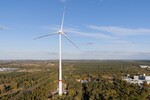News Release from Global Wind Energy Council
Wind Industry Profile of
Wind industry charts path out of energy crises with action plan for world leaders
The plan is published against the background of record temperatures and economic stress around the world driven by these crises. A heatwave has caused thousands of deaths in Spain and Portugal, while drought and wildfires have affected France, Italy, Greece, Croatia, Turkey and Morocco this year. Historic high temperatures are hitting the UK and US, India has experienced a series of heatwaves over recent months and China endured its hottest June on record this year. Meanwhile, the energy crisis has contributed to an economic crisis, massive civil unrest and political instability in Sri Lanka.
These events are connected, and symptomatic of a disorderly, volatile energy transition. They highlight the need for urgent action to accelerate the deployment of renewable energy to ease economic pain, lower energy costs and put us on a net zero pathway. Wind energy can be rapidly scaled up in the next few years to offer solutions to power price volatility, energy insecurity and fossil fuel dependency, while building a secure energy transition in the mid-to-long-term.
Ben Backwell, Global Wind Energy Council (GWEC) CEO, said: “The world is facing twin crises of energy security and affordability on the one hand and the threat of accelerating global heating on the other. It needs to make a decisive shift away from fossil fuels, rather than prolonging reliance on them.
“The solution must be led by renewables, which can deliver clean and reliable electricity to citizens and businesses using the limitless, indigenous resources of the wind and the sun.Rapidly scaling wind energy can also provide enormous societal benefits, from additional jobs to inward investment to cleaner air and greater water security.
“We are witnessing policy and market misalignments in terms of achieving the energy transition, resolving the energy trilemma and delivering a green recovery in the wake of the COVID-19 pandemic.
“The five steps in this plan will help to ease some of the bottlenecks to renewables deployment caused by a lack of political will, overly lengthy permitting schemes or priority for incumbent polluting fossil fuels. Aligning policy with the recommendations can support governments in achieving an orderly transition and escape from the dangers of relying on fossil fuels.”
The Five-Point Plan
With five actions, governments can enable huge volumes of green energy to ease the energy security and climate crises, while avoiding decisions which lock in fossil fuel dependency and risk worse crises in the future.
- Urgently streamline permitting to produce a huge increase in wind capacity in the next 1-3 years and build a net zero-compatible project pipeline.
- Implement a grid access action plan to get large volumes of renewable energy connected.
- Introduce simplified mechanisms for clean power procurement and pricing to rapidly unlock investment.
- Avoid locking in large-scale fossil fuel-based generation.
- Commit to firm energy transition plans and milestones to allow the renewables industry to plan for healthy supply chain development.
Policymakers must make sensible decisions which prioritise the energy transition and are sensitive to the social, economic, environmental and national security risks of prolonged dependency on fossil fuels. These five steps can usher in a system transformation which benefits all of society.
- Source:
- GWEC
- Author:
- Press Office
- Link:
- gwec.net/...
- Keywords:
- GWEC, wind industry, energy crisis, action plan, world leaders, government, renewables, market, energy security

























